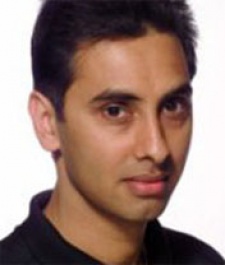If you want yet another example of the massive shift in developers' attitudes in terms of the pain of making games for traditional mobile and their joy concerning iPhone and iPod touch, Nalin Sharma is happy to provide.
He had been working on a mobile racing game since 2005 but despite being commissioned to port it to various devices as a technology demo, it never got released.
Fast forward to 2009, and after three months of work, it was up on the App Store and selling copies.
We interviewed Nalin concerning that game - Killer Edge Racing - over on Pocket Gamer, but considering his position as an industry consultant, we've also broken out some of his views on App Store's disruptive impact on mobile gaming.
As a long time indie developer, what to do think about the variety of options now open to you in terms of things like App Store, DSiWare?
One of the nice things about the App Store is the explosion of creativity and the sheer variety of games available, but the biggest problem will be how to stand out in a sea of content.
There are still big opportunities to be successful on the App Store, and it is something I hope to write about after my learnings from Killer Edge Racing. Moreover, I have been doing a lot of consulting in the field of mobile applications and I have specific ideas as to how applications can stand out and be really successful.
Apple has disrupted the industry by breaking the razors/razor blades model because it makes its money primarily from hardware, which is one of the reasons Apple does not have to woo specific publishers.
Outside of the Apple platforms, I think the situation has changed forever and it cannot help but impact those: but you need to remember that these companies are running a different business model.
Furthermore this disruption comes at a time when the games industry is in crisis and virtually all platforms have an abundance of content and consequently developing a strategy to deal with this will be the foundation for success.
If one accepts that publishing has become democratised then it becomes more crucial to identify precisely what value your proposition/game brings to the consumer.
As for mobile gaming platforms from other phone manufacturers they are effectively finished, as they are 2-3 years behind Apple, and they have no expertise or competence to be able to catch up.
I predict that within two years the same situation will occur for mobile applications that happened for digital music - that Apple will have locked up 70-80 per cent of the online sales, leaving Nokia, Sony Ericsson and Samsung to fight it out for the remainder.
There is a way that they can compete and if they hire me as a strategy consultant I will gladly show them how to do this!
What's it like being your own publisher on App Store?
Being a publisher on the App Store is a fabulous experience, particularly as I wrote a piece for Pocket Gamer.biz (How to create compelling business models on the App Store) about creating business models on the App Store and now I'm doing it for myself.
One of the key learning points is that you get information in real-time which lets you make decisions about what to do whenever you want. For example, I tried searching for "racing" and Killer Edge wasn't in the top 100, but after changing the name in iTunes Connect to Killer Edge Racing it went up to number 33, and subsequently to 28.
However when searching for "driving" it is still not in the top 100, despite having this as one of the keywords within the description.
I did read that having "Angelina Jolie" as keywords would increase an application's search rankings, but unless I can definitively say Angelina Jolie plays Killer Edge, I guess I would be lying ; )
Thanks to Nalin for his time.
Nalin Sharma on why mobile gaming is 'effectively finished'
And how adding 'Racing' to Killer Edge's title boosted App Store listing






















